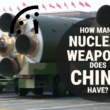Toward the platform of authority
By Reshmi Kazi, June 13, 2014
My roundtable colleague Salma Malik wrote in Round Two that "women won’t contribute much to their own empowerment if they try to fit themselves into feminist straitjackets—if they attempt to create an exclusive community of nuclear experts who think and perform differently from men." Fortunately, fitting oneself into a straitjacket isn’t necessary. Rather, women can empower themselves, while also contributing meaningfully to nuclear decision making, by fulfilling their roles—traditional in many societies—as guardians of morals and ethics. That is, by highlighting the unconscionable possibility of nuclear war, women can help their nations avoid grave strategic errors while also advancing gender equality.
That said, and as I argued in Round One, women cannot expect to gain greater representation in nuclear decision making simply on the basis of their gender, or by displaying qualities traditionally associated with their gender. If women favor disarmament, for example, they must be in position to create the changes that they wish to see enacted. To an extent, this means gaining expertise in fields such as physics, nuclear technology, and nonproliferation studies, but it also means casting aside the inhibitions that many women feel about acting ambitiously and asserting themselves. It means dispensing with any sense of burden that women may experience on account of their sex.
Permission to marry. Malik wrote in Round Two that Pakistani women have made great strides over the decades toward equality in nuclear affairs—and the same is true in India. In 1949, Chonira Belliappa Muthamma became the first woman to join the Indian Foreign Service. At first she faced institutional barriers that are hard to imagine today, including a stipulation that any woman employed in the service must receive written permission before marrying. If the government decided that her family responsibilities were interfering with her work, she could be forced out. Muthamma eventually ascended to the foreign service’s most elite levels, knocking down many barriers along the way. Her perseverance cleared a path for women who would enter the service later. By March 2014, almost one-fifth of the officers in the foreign service were female. Sixteen ambassadors were women. And in 2010, when India’s foreign secretary explained to the international community India’s commitment to disarmament—as well as to agreements banning first use of nuclear weapons and use of nuclear weapons against non-nuclear weapon states—it was Nirupama Rao, a woman, who laid out the nation’s views.
A woman such as Rao must exhibit great competence to attain her position. But it sometimes seems that women who do reach the highest levels, far from being dismissed as "weak" or ignored on account of their gender, are listened to more attentively than their male counterparts, at both the national and international levels. One might argue that these women are accorded respect only because they speak from very authoritative platforms, and that women without so much power are still ignored too often—but isn’t this the very reason that women must seek greater representation in positions of authority?
Topics: Nuclear Weapons
Share: [addthis tool="addthis_inline_share_toolbox"]














